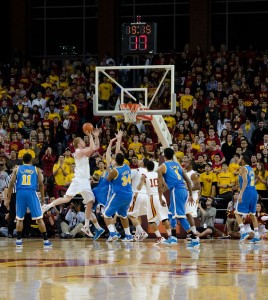UCLA puts an end to Trojans’ trying season
The Pac-12 tournament contest between USC and UCLA carried a distinctly familiar feel for the Trojans.
Holding a 19-13 lead in the waning moments of the first half, freshman guard Byron Wesley drilled a 15-footer to give No. 12-seeded USC a 21-13 lead with about four minutes left to play.

End of the line · The season ended promptly for junior center James Blasczyk and the Trojans on Wednesday after a 55-40 loss at the the hands of the Bruins. The Trojans finish the season at 6-26. - Luciano Nunez | Daily Trojan
But things once again spiraled out of control for the USC men’s basketball team (6-26, 1-17).
The Bruins (19-13, 11-7) would promptly close the half with nine straight points as part of a 26-4 run that spanned nearly 10 minutes over two halves, ending the Trojans’ nightmarish season 55-40 in front of an announced crowd of 5,973 at the Staples Center. It also marked the third time this season that USC has fallen to its crosstown rival. The team’s 26th loss of the season was the most in program history.
“The way the [first] half ended set us up for failure in the second half and put us in a position where they had the momentum,” USC coach Kevin O’Neill said. “They kind of just wore us down on the boards. Their size got us.”
UCLA will advance to the quarterfinals of the conference tournament and face Arizona on Thursday at 2:40 p.m.
For parts of the game, O’Neill’s young bunch had chances. They led 5-4 in the early goings. They led 8-7 about halfway through the opening period. They also led by as much as eight points.
But again, they hit a wall and were outscored by 14 points in the final 20 minutes.
“We came out strong,” Wesley said. “We had a lot of energy the first half. We had a lot of momentum. [In the] second half, we had the same game plan — [we] wanted to come out strong, but things just didn’t pan out.”
The Trojans were outrebounded 42-33 over the course of the game, and had trouble dealing with center Joshua Smith, who played eight minutes in the second half and registered five points after he was benched for the first 20 minutes because of a violation of team rules.
With Smith sidelined for the first half, the Trojans fared relatively well — at least on defense.
The Bruins shot just 23 percent from the field, making seven field goal attempts compared to the Trojans’ eight. Over the first 10 minutes, they were 3-for-20 from the field.
In the second half, by comparison, they finally found their stroke, making 46 percent of their field goal attempts.
“We wanted them to shoot jump shots,” O’Neill said. “To be honest with you, none of our bigs can really match up with them man-for-man across the front line.”
The USC roster features just one healthy player taller than 6-foot-7 in junior center James Blasczyk, whereas UCLA boasts five players 6-foot-9 or taller in Smith, center Anthony Stover and forwards Brendan Lane, David and Travis Wear.
To make matters more difficult, the Trojans, who were already undersized, struggled shooting-wise from the perimeter, converting less than 30 percent of their shots.
And just two players, Wesley, who finished with 13 points, and sophomore forward Garrett Jackson, who had 11, finished in double-figures.
The starting backcourt of sophomore Maurice Jones and senior Eric Strangis was largely ineffective offensively, combining for 12 points on 3-of-12 shooting.
“Unfortunately, we didn’t do enough on the offensive end to win it,” O’Neill said.
After setting a program record for most losses in a single season, the Trojans appeared relieved — at least to some degree — to conclude one of the more disappointing seasons in recent memory.
By season’s end, just six scholarship players were available as a result of numerous injuries — five players had been sidelined for most if not all of the season, in addition to lost recruiting classes as the result of sanctions.
“We do have a bad taste in our mouth,” Jackson said. “We don’t like losing. Things would have been a lot different if we were full force and didn’t have as many injuries, so I’m definitely looking forward to playing with everybody at full health.”
O’Neill also expressed frustration after the Trojans dropped 18 of their 19 games to conclude the year.
“We became irrelevant as losses mounted,” he said. “That’s not something we want to be as a program ever again.”
